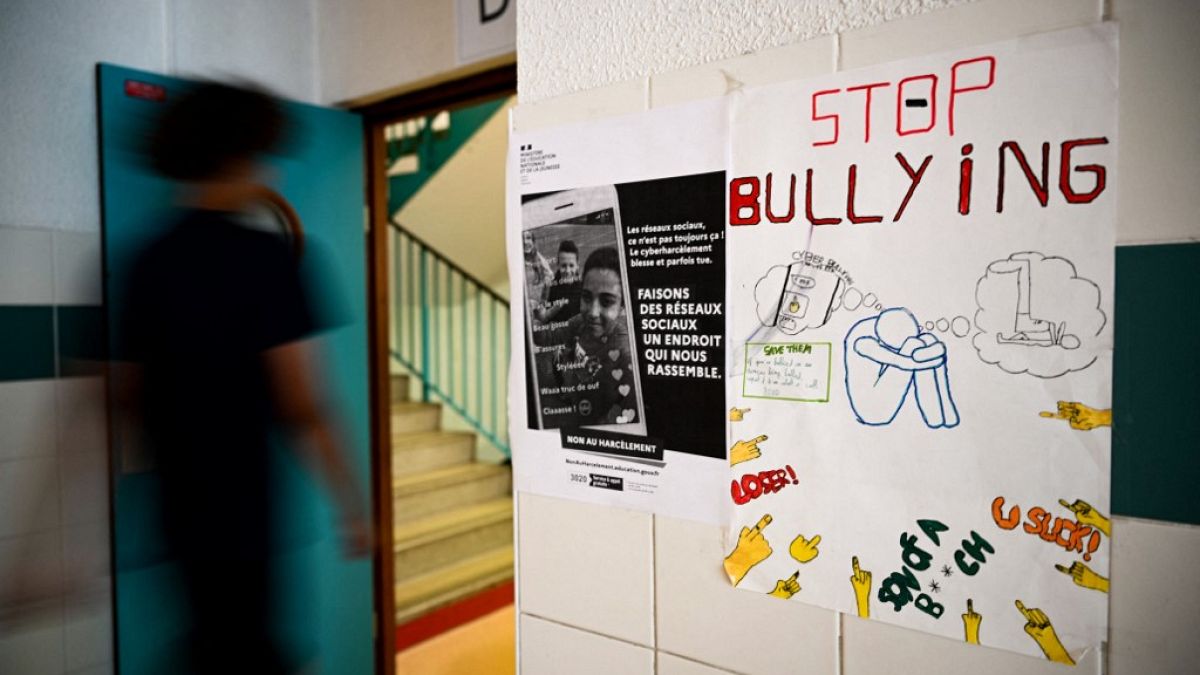School bullying is nothing new. But now, with the rise of social media and smartphones, what used to stop at the school gates now follows many children home. And legislation struggles to keep up with modern threats.
Warning: this article mentions suicide and self-harm. Everywhere in Europe, minors can get help for free by calling 116 111. Other resources are available here. In the UK, adults can call 116 123 or text "SHOUT" to 85258.
Tragic examples of teenagers being bullied regularly make headlines. In May 2023, Thirteen-year-old French girl Lindsay died by suicide after months of physical and psychological violence at school and online.
A few years earlier, Irish teenager Nicole Fox experienced the same fate. She was just 21 years old.
Since then, her mother Jackie Fox has been campaigning to make cyberbullying a criminal offence.
Named after her late daughter, Coco’s Law was adopted in 2021 in Ireland. After speaking with some European lawmakers, Jackie Fox said she was optimistic it could be implemented further afield.
No EU-wide legislation
There is no EU-wide anti-online bullying law so far, only European directives. They have no legal value, and the way member states implement them in their jurisdiction remains up to them.
Without available legislation before her suicide in 2018, Jackie Fox said her daughter felt powerless to deal with her bullies, as authorities had no means to prosecute them for the violence she was being subjected to online.
“Coco was her baby name, her pet name,” Jackie Fox told Euronews.
“I hope Coco’s Law will save lives, here in Ireland, and in Europe. But it’s also about helping victims, that may feel lonely, or maybe are self-harming, to get help. Because before, they had no proper resources to turn to.”
Other countries have similar pieces of legislation. In France, online bullying is punishable by law since 2014.
Social media platforms are legally responsible and must react when made aware of elements pertaining to bullying.
Acting only after the damage is done
Existing legislation in European countries presupposes cyberbullying is already happening for perpetrators to be prosecuted, or for social media moderators to delete posts.
Following the 13-year-old French teenager’s death, hateful online comments were still being posted. On Instagram, an unequivocal account was created: 'lindsay_est_enfin_morte' ("Finally, Lindsay’s died” in English). It has been deactivated since.
Lindsay’s family pressed charges against Facebook and Instagram, denouncing their failures in moderating hateful content, before and after their daughter’s suicide.
Euronews contacted Meta, which owns both social networks. No spokesperson was available for an interview. In a written statement, Meta offered condolences to Lindsay’s family and said the platform was acting against content and accounts that go against its rules when it was made aware of their existence.
Associations are left wondering whether bullying must be actively ongoing before anything is done to stop it. According to Justine Atlan, Director of the French anti-bullying association e-enfance, social media platforms have the means to react before other users report problematic posts.
Can social media do more?
The principle of algorithms is indeed to target and propose specific content based on users’ preferences, notably for commercial purposes.
Atlan told Euronews: “Since we know they can actively meddle with content, we could expect their legal responsibilities to be more important, to compel them to target some content we know to be dangerous.”
Some already implemented technologies allow platforms to target content that was previously reported by users and deleted a first time by the platform.
Meta, on its page dedicated to bullying prevention, states: “We use preventative photo-matching technologies.
"If someone tries to share the image after it has been reported to us and removed, we will alert them that it violates our policies.
"We also stop the resharing attempt and may disable the account.”
